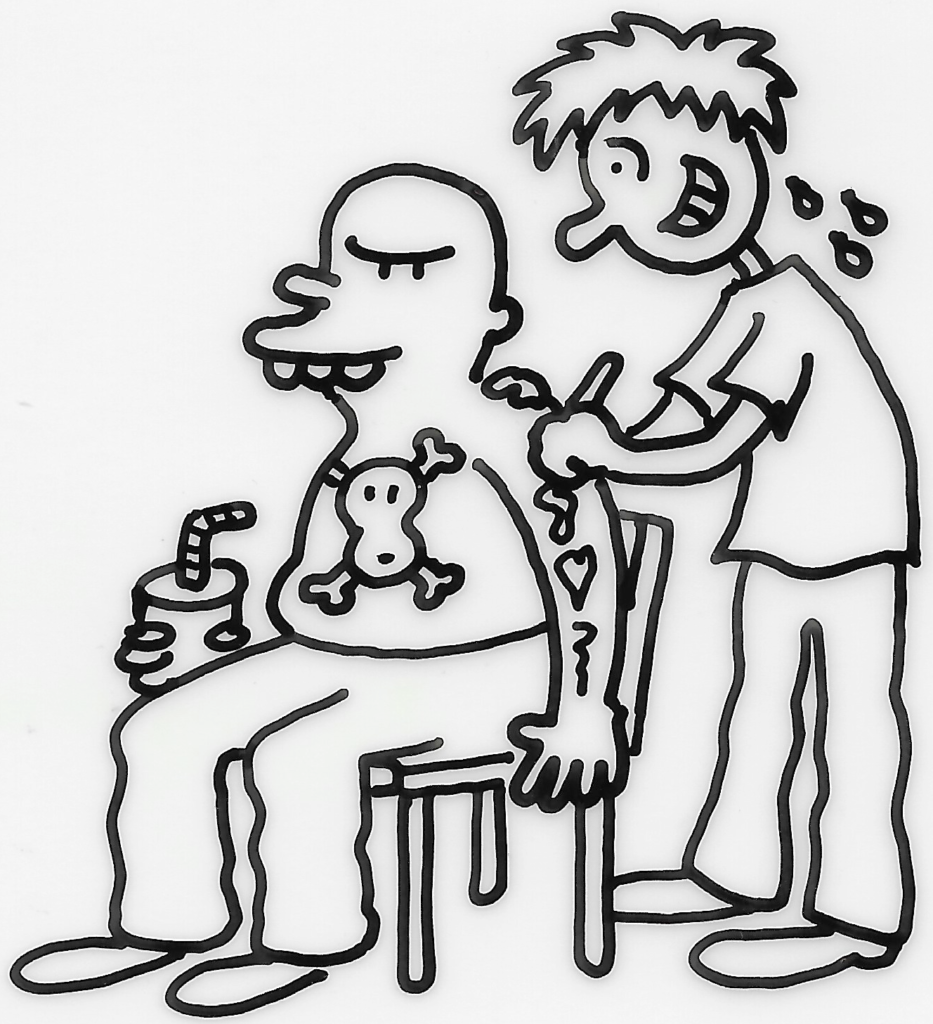
TIP #1: Let your emotions run wild.
With just a few lines, you can make your characters bored, nervous, upset, guilty, angry or lovesick. Play with the shape and positioning of eyes, eyebrows, and mouth.


TIP #2: Give us the deets.
To tell us who your characters are, load them up with interesting details. These details provide tons of information, and give your characters personality. You can do this with glasses, accessories, hairstyles, and antennae.
Once your characters have personality, it’s easy to write stories for them




Tip #3: A Dog Always Makes the Scene Funnier
I don’t why, but it does.

Same scene, plus dog.

TIP #4: Go crazy with lettering
Cool lettering makes words pop off the page. You can get ideas from comic books, store signs, magazine type, or websites that offer free fonts. Make the letters fuzzy, bubbly, scratchy, hairy, shiny, wavy, icy, woody, or computer-y.
Here’s lettering from the Loser List, on graffiti, tattoos, comic books.




Tip #5: It’s okay to cheat.
Cartoonists aren’t born knowing how to draw ten-speed bikes, cactuses, and football stadiums. Some objects you can draw from memory, but other things require “reference”–a picture or photo of the image. To draw this picture for PRINCIPAL’S UNDERWEAR, I had to look at picture of a hand to get the positioning right.


Tip #6: Speak the language of cartoons
Cartoons have a language of their own, with symbols that communicate in “shorthand.” We already know most of these symbols.
For example, what does it mean when a character has a light bulb over his head?

Can you tell what’s inside the bottle?

What’s this guy doing?

What do X’s for eyes mean?

Or a clothespin on the nose?

And smoke coming out of someone’s head?

Tip #7: (Don’t) Use your words
Comics is a visual medium, so we try to get our message across using as few words as possible.




Tip #8: Anthropomorphize.
In other words, make objects or animals behave like people. These insects are standing in a movie line.

These vegetables are in a rock band.

Have you ever seen a toilet bowl, or a home run?


Tip 9#: SPLAT! Have fun with sound effects.
The bigger the letters, the louder the sound

Choose a word that sounds like the action in the picture


Repeating a word adds to its effect


Tip #10: Line it up!
Lines are the cartoonist’s friend. Here are some different kinds:
Speed lines

Panic lines:

Floating-through-air lines:

Stink lines:

TIP #11: If at first you don’t succeed, draw, draw again.
It’s not unusual for me to draw something fifty times before I get a version I like. Here are early versions of my main character, Becca, in PRINCIPAL’S UNDERWEAR.



TIP #12: Keep a sketchbook.
Always keep a sketchbook handy, so you can quickly jot down any fun detail you see, or idea that occurs to.

Maybe you see a funny store sign, or t-shirt that would be perfect on one of your characters. I saw this slogan on a t-shirt once, and made note of it. Later it showed up on Logan, from THE LOSER LIST.

I also make note of cool hairstyles and jewelry.

Here are a couple pages from an old sketchbook…

This is my old apartment in the Village.

Now you know all my secrets. Have fun, and don’t forget to…
KEEP DRAWING!
